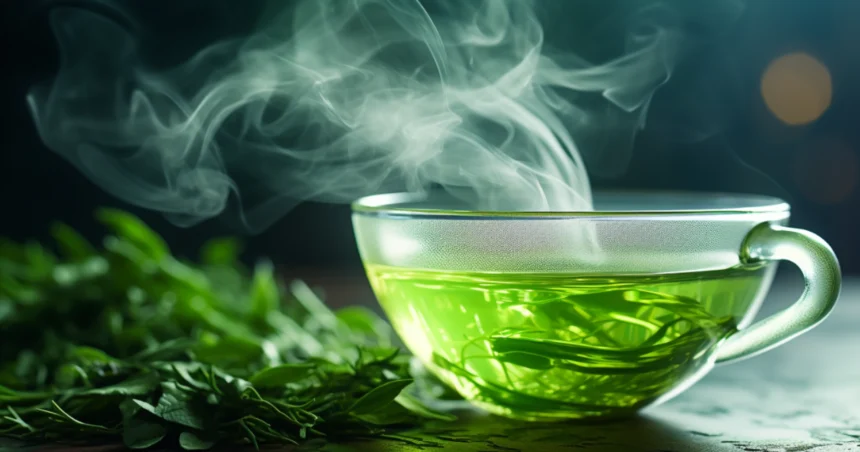Green tea, a staple in many cultures, boasts a rich tapestry of history that’s as deep as the flavors it offers. Originating from the heartlands of China, this humble leaf has traveled continents, leaving tales of tradition and ceremony in its wake. But it’s not just about age-old customs; green tea’s health benefits are widely recognized.
From heart health to cognitive boosts, it’s become a global favorite for the wellness-conscious. And now, a new chapter unfolds: athletes are turning to green tea, keen to harness its unique benefits. Dive in as we explore how this ancient brew might just be a modern-day game-changer for sports enthusiasts.
Green Tea: A Comprehensive Overview
Tracing its roots back to ancient China, green tea has seen centuries pass, evolving into a global phenomenon. With each dynasty and era, it’s been cherished, finding its way into daily rituals and grand ceremonies alike. But, it’s not just history that’s besotted with this drink. Modern science sings praises too. A treasure trove of health perks, the green tea benefits are backed by a plethora of studies.
From boosting brain functions to fortifying our immune defenses, it’s no wonder folks worldwide raise their cups in a collective toast. A blend of tradition and research, green tea stands as a testament to nature’s wonders.
Key Components of Green Tea
Ever wondered what gives green tea its renowned health edge? Dive into its components, and you’ll find catechins at the helm. These natural antioxidants are the heart and soul of green tea’s magic. And standing tall among them is epigallocatechin-3-gallate, or as enthusiasts affectionately call it, EGCG. This mighty compound packs a punch, making headlines for its potential health impacts.
But EGCG isn’t riding solo. The green tea benefits extend further, with its robust antioxidant properties taking center stage. These antioxidants are the unsung heroes, battling those pesky free radicals, and shielding our cells from potential harm. In essence, every cup offers a protective barrier, a blend of ancient wisdom and modern science.
Potential Health Benefits of Green Tea
Green tea has been consumed for centuries, but modern science is still uncovering its wide range of potential health benefits. While more research is needed, studies indicate drinking green tea may provide perks like enhanced brain function, anti-aging antioxidant activity, and protective effects for your cardiovascular system. Let’s break down the science-backed green tea benefits.
Antioxidants: Antioxidants like epigallocatechin gallate (EGCG) are green tea’s main claim to fame. Antioxidants combat free radicals that damage cells, contributing to aging and disease. The abundance of antioxidants in green tea may help strengthen the immune system and prevent cell degradation.
Weight Management: When it comes to weight management, the caffeine and EGCG in green tea may give your metabolism a kickstart. Studies show green tea can boost fat burning and help people lose a small amount of weight when consumed regularly. Green tea benefits for weight loss are likely maximized when combined with a healthy lifestyle.
Brain Function: The bioactive compounds in green tea, like L-theanine, also seem to have positive effects on brain health and cognition. Regular green tea drinkers may experience enhanced memory, focus, and information processing compared to non-tea drinkers. The antioxidants in green tea may also offer protection against neurodegenerative diseases like Alzheimer’s and Parkinson’s.
Cardiovascular Health: Green tea consumption is associated with lower risks of cardiovascular diseases, like high blood pressure and stroke. The catechins help relax blood vessels, prevent blood clots, and reduce LDL cholesterol levels – all protective factors for heart health. But more research is needed to establish direct cause and effect relationships.
Skin and Digestive Health: Beauty and wellness enthusiasts, rejoice! Green tea could be beneficial for skin health, giving it that sought-after glow. Plus, it’s gentle on the stomach, promoting better digestion.
Immune System: Our body’s defense system gets a leg up with green tea. Its properties may offer protection against harmful oxidants and radicals. It’s like equipping your immune soldiers with better armor.
Liver Disorders and Type 2 Diabetes: The liver, our diligent detoxifier, might benefit from regular green tea consumption. Additionally, there’s chatter about its potential role in regulating blood sugar levels, making it a topic of interest for Type 2 Diabetes research.
However, it’s crucial to strike a note of caution. While the green tea benefits are exciting, it’s vital to remember that more scientific evidence is needed. And like all things, moderation is key. Overconsumption might lead to potential health concerns.
Green Tea’s Influence on Athletic Performance
Athletes are always on the lookout for that extra edge, that nudge to take them a step closer to their personal best. Enter green tea. Beyond its soothing sips, this brew might have some tricks up its sleeve for the sports aficionados.
Improved Sports Performance: Green tea’s abundant antioxidants like EGCG may enhance athletic performance by countering exercise-induced oxidative stress and protecting muscle function and energy efficiency. However, larger scale studies are required to confirm performance benefits.
Enhanced Exercise Recovery: Muscle recovery is paramount for athletes. The quicker and more effective the recovery, the better prepared you are for the next challenge. Catechins, abundant in green tea, play a pivotal role here. They might aid in muscle repair and bolster neuromuscular activation. Think of them as your post-workout buddies, helping you bounce back with gusto.
Increased Endurance: Every athlete dreams of that enduring stamina, the ability to push a tad longer, run a bit further. Green tea might have a say here. By enhancing metabolic flexibility, it could potentially boost exercise endurance. It’s like having wind beneath your wings, propelling you forward.
Fat Metabolism: Here’s some food (or drink) for thought: green tea might help athletes utilize fat more efficiently as an energy source. By optimizing fat metabolism, it ensures you have that sustained energy, especially during prolonged activities.
Anti-Inflammatory Effects: Post-exercise inflammation and muscle soreness can be a real dampener. But guess what? Green tea wades in with its anti-inflammatory properties, possibly reducing those aches and sore spots. It’s like a gentle massage at a cellular level, soothing and comforting.
Considerations for Athletes
While the green tea benefits for athletes paint an enticing picture, it’s essential to step back and consider the broader landscape. The research is ongoing, and every day we’re learning more about this ancient brew’s modern-day applications. However, not all athletes will hoist the green tea flag equally. Individual responses can vary.
It’s not just about how many cups you gulp down; it’s about how your body processes it. That’s why, before integrating green tea into your regimen, a chat with nutrition and healthcare pros is a smart move. They’ll guide you on the right path, ensuring you harness the power of green tea without any hiccups.
Final Thoughts
In summary, early research suggests potent anti-inflammatory, antioxidant, and metabolic properties of green tea may offer athletes a legal and natural way to enhance performance, accelerate recovery, and reduce muscle damage. While current evidence is limited, green tea reveals promising possibilities for mitigating oxidative stress, increasing endurance and fat burning, speeding muscle recovery, and protecting overall health.
However, more rigorous clinical trials are needed to substantiate potential benefits and optimal protocols. Athletes should emphasize balanced consumption, thorough personal research, and consultation with healthcare professionals when evaluating green tea. With further high-quality studies, green tea may soon become a staple among sports nutrition strategies. But for now, a reasonable and moderate approach is recommended.









